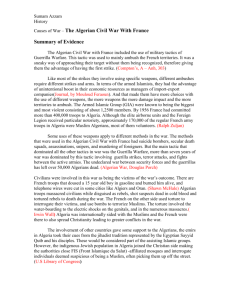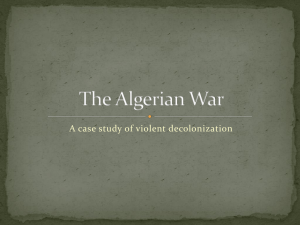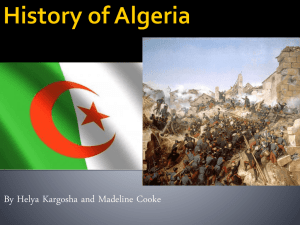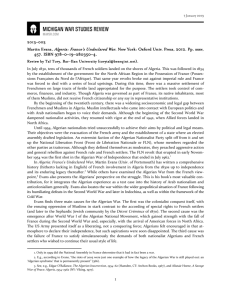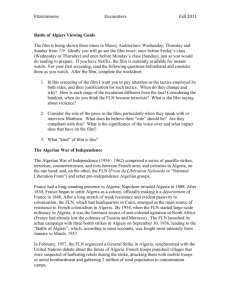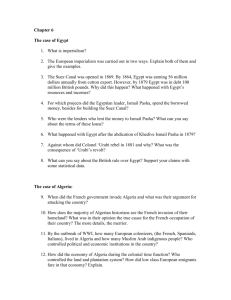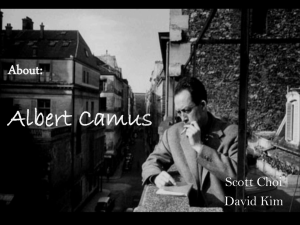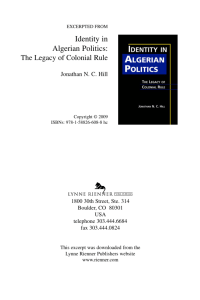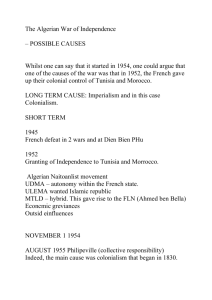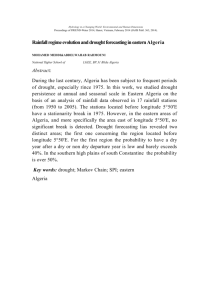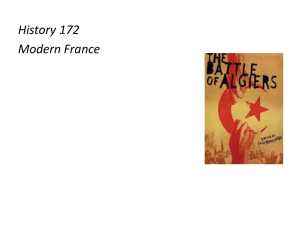Anne Schmidt
advertisement
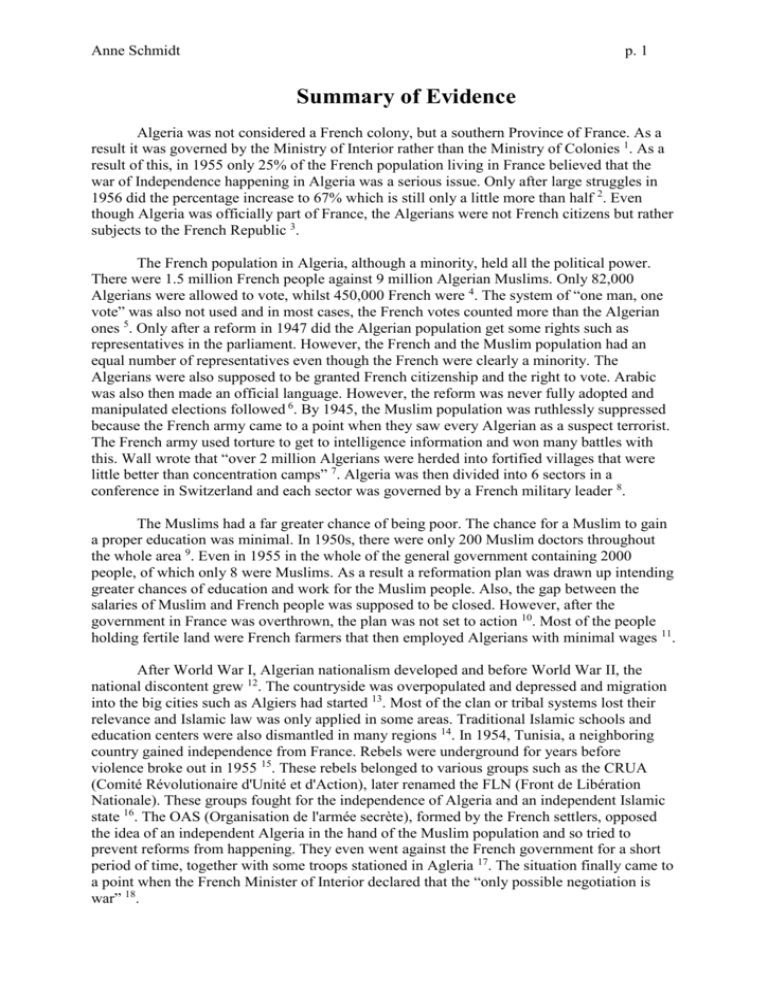
Anne Schmidt p. 1 Summary of Evidence Algeria was not considered a French colony, but a southern Province of France. As a result it was governed by the Ministry of Interior rather than the Ministry of Colonies 1. As a result of this, in 1955 only 25% of the French population living in France believed that the war of Independence happening in Algeria was a serious issue. Only after large struggles in 1956 did the percentage increase to 67% which is still only a little more than half 2. Even though Algeria was officially part of France, the Algerians were not French citizens but rather subjects to the French Republic 3. The French population in Algeria, although a minority, held all the political power. There were 1.5 million French people against 9 million Algerian Muslims. Only 82,000 Algerians were allowed to vote, whilst 450,000 French were 4. The system of “one man, one vote” was also not used and in most cases, the French votes counted more than the Algerian ones 5. Only after a reform in 1947 did the Algerian population get some rights such as representatives in the parliament. However, the French and the Muslim population had an equal number of representatives even though the French were clearly a minority. The Algerians were also supposed to be granted French citizenship and the right to vote. Arabic was also then made an official language. However, the reform was never fully adopted and manipulated elections followed 6. By 1945, the Muslim population was ruthlessly suppressed because the French army came to a point when they saw every Algerian as a suspect terrorist. The French army used torture to get to intelligence information and won many battles with this. Wall wrote that “over 2 million Algerians were herded into fortified villages that were little better than concentration camps” 7. Algeria was then divided into 6 sectors in a conference in Switzerland and each sector was governed by a French military leader 8. The Muslims had a far greater chance of being poor. The chance for a Muslim to gain a proper education was minimal. In 1950s, there were only 200 Muslim doctors throughout the whole area 9. Even in 1955 in the whole of the general government containing 2000 people, of which only 8 were Muslims. As a result a reformation plan was drawn up intending greater chances of education and work for the Muslim people. Also, the gap between the salaries of Muslim and French people was supposed to be closed. However, after the government in France was overthrown, the plan was not set to action 10. Most of the people holding fertile land were French farmers that then employed Algerians with minimal wages 11. After World War I, Algerian nationalism developed and before World War II, the national discontent grew 12. The countryside was overpopulated and depressed and migration into the big cities such as Algiers had started 13. Most of the clan or tribal systems lost their relevance and Islamic law was only applied in some areas. Traditional Islamic schools and education centers were also dismantled in many regions 14. In 1954, Tunisia, a neighboring country gained independence from France. Rebels were underground for years before violence broke out in 1955 15. These rebels belonged to various groups such as the CRUA (Comité Révolutionaire d'Unité et d'Action), later renamed the FLN (Front de Libération Nationale). These groups fought for the independence of Algeria and an independent Islamic state 16. The OAS (Organisation de l'armée secrète), formed by the French settlers, opposed the idea of an independent Algeria in the hand of the Muslim population and so tried to prevent reforms from happening. They even went against the French government for a short period of time, together with some troops stationed in Agleria 17. The situation finally came to a point when the French Minister of Interior declared that the “only possible negotiation is war” 18. Anne Schmidt p. 2 The FLN was the leading political party wanting Algeria’s independence. They installed a provisional government in 1958. However they had to fight the war using guerrilla tactics 19 because they could not go against the whole French army which consisted of 400,000 troops of which 170,000 were Algerian volunteers. The revolt started on 1.11.1954 when guerrilla fighters attacked French military installations throughout the country. The violence continued and in 1955 the FLN massacred the town of Phillippeville killing old people and babies. This revolt and other guerrilla activities in 1955 were brutally suppressed and many of the guerrilla fighters, including one of the six main leaders of the FLN were killed. As a result, the all out war between France and the FLN guerrillas began 20. Analysis The unequal distribution of economical resources and political power were the main reasons for the 1954-1962 Algerian War. In 1956, the tension in Algeria was so tense that even the French Minister of Interior said that the “only possible negotiation is war” 21. At this moment, the prospect of solving the conflict by negotiation was very small. Most historians argue that the unequal distribution of economical resources and political power were the main reason for the 1954-1962 Algerian War. What made it possible for the FLN to take power? The CRUA, later renamed the FLN, was the driving force for the opposition to the French government. It was formed in 1954 and, after working underground for several years, took action in 1955 22. World War I and II strengthened the position of the nationalists because the peace treaties ending both wars promised the end of colonization and autonomous rule for all peoples 23. After Tunisia got independent in 1954 24, they were surer about their position and the claim of an independent Algeria because they were shown how a country in their own position got independent from the same colonial power. The fact that most of the French people did not realize the seriousness of the situation 25 also helped them get power, because then they were able to organize themselves before anyone really took action. Lastly, the majority of people in Algeria were very discontented with the political and economical situation in Algeria and so were backing the guerilla movement that promised a free, independent state. Why were people unhappy about the French colonial rule? The problems started in 1830 when the first French settlers came to Algeria and overtook all the fertile land 26. Because of this, most Muslim Algerians were extremely poor and seeking employment in the cities or on the French farms. With this, nearly all of the economic resources were in the hands of the French settlers 27. The politic state the country was in also made the Algerians discontent. They were not able to obtain French citizenship while Algeria was considered a French province and so not autonomous 28. Only very few Muslims were able to attend school and get a better chance in finding a job 29. The French government and military leaders ruthlessly suppressed anyone trying to fight against the French government and for an independent Islamic state of Algeria 30. Basically, the Muslim Algerians were discriminated against in their own country. Of course, the Algerian majority was discontented with this and was eager to get rid of the French suppression power. Anne Schmidt p. 3 How successful were the French in trying to make people happy? The reason why the French population did not realize the conflict in Algeria was the fact that they were too comfortable in their position of luxury 31. So then, when the politicians noticed how serious the crisis was, they tried to smoothen up the tides and integrate the Algerian Muslim population into the government and the economy of the country. They set up various reformation plans and similar constitutions promising Algerians citizenship and more rights like free voting 32. However, the OAS, formed of settlers that were used to being treated favorably, was strongly against these attempts made by the French government and were not willing to give up any privileges 33. For this reason, all of the reformation plans failed to operate fully at any time 34. In fact, it was after the reformation plans and their failure that the Algerians started to rebel actively and that the French started to suppress and torture Algerian Muslims 35. So even though the French government originally tried to give the Algerian population more freedom and rights, they failed because of opposition of their own people. The fact that rights were withdrawn again further tensed the situation and deepened the crises. Anne Schmidt p. 4 Citations Summary of Evidence Analysis 1 21 2 22 Webber Talbott, 2-3 3 Ruedy, 4 Lawless, 5 Webber 6 Lawless, 7 Wall 8 Lawless 9 Lawless 10 Webber 11 Hourani 12 Lawless 13 Hourani 14 Ruedy 15 Aguiar 16 Webber 17 Aguiar 18 Zuljan 19 Aguiar 20 Zuljan Zuljan Aguiar 23 Lawless 24 Webber 25 Talbott, 2-3 26 Webber 27 Hourani 28 Ruedy 29 Hourani 30 Wall 31 Webber 32 Lawless 33 Aguiar 34 Webber 35 Wall Anne Schmidt p. 5 Bibliography Hourani, Albert. A History of the Arab People. 1st Ed. Cambridge, Massachusetts: The Belknap Press of Harvard University Press, 1991. Ruedy, John. "Algeria."Encyclopedia of the Modern Middle East & North Africa. 2nd Ed. 2004. Aguiar, Marian. "Algeria."Africana. 2nd ed. 2005. Lawless, Richard L.. "History of Algeria."The Middle East & North Africa. 44th ed. 1997. Wall, Irwin. "Review Essay." 2006. 1 Dec 2008 <http://216.239.59.132/search?q=cache:VI4FArE2YKYJ:www.hnet.org/~diplo/essays/PDF/WallHorne.pdf+Alistair+Horne+A+Savage+War+of+Peace&hl=en&ct=clnk&cd=3&gl=qa >. Zuljan, Ralph. "Algerian War of Independence 1954-1962." Armed Conflict Events Data. 27.11.2003. On War. 1 Dec 2008 <http://www.onwar.com/aced/data/alpha/algeria1954.htm>. McHale, Shawn. "Torture Didn't Work for the French in Algeria Either." HNN History News Network 21.6.2004 1 Dec 2008 <http://hnn.us/articles/5458.html>. Talbott, Johan. "Notes and Suggestions." JSTOR. 1975. 1 Dec 2008 <http://www.jstor.org/stable/286132?seq=1>.
